WebAssembly in its current MVP form is shipped by all major browsers and is already capable of amazing things. This does not mean that its development has concluded: on the contrary, there are many post-MVP feature proposals at different stages of development.
One such proposal is about adding the so-called anyref / externref type (and related instructions) to the specification. But what is anyref, and why is it desirable to add it to WebAssembly?
WebAssembly Anyref
The full proposal is explained in detail in this repo, but the basic idea is to be able to represent opaque host references (JavaScript objects in the case of a Web Browser) from WebAssembly. Even with this proposal, these references can only be passed around via function arguments and return values, and stored and loaded in tables. Future proposals will expand what is possible to do, and eventually lead to full GC support in WebAssembly.
The current specifications of anyref are quite limiting, and in particular, they don’t allow to store these references in linear memory directly. They need to be stored in a table at an index, and then the index itself can be stored in linear memory. Doing this requires some runtime bookkeeping of tables, to “allocate” and “deallocate” slots and give out indices.
Integrating anyref support directly in languages like C/C++ and Rust (i.e. directly representing a DOM object as anyref) is not straightforward, and the current mainstream opinion seems to be to use anyref under the hood in autogenerated glue code while keeping the actual user-written code dealing with just indices (see here for an interesting thread discussing this).

Cheerp
I work on Cheerp, a C++ to JavaScript and WebAssembly compiler based on LLVM.
The Cheerp compiler is in an interesting and unique position here: since its inception, it has supported an object memory model, where C++ objects are stored as JavaScript garbage collected objects, in addition to being able to store them in a contiguous linear memory (which is the memory model of WebAssembly).
This allows Cheerp to compile C++ code to regular JavaScript, and interoperate easily with JavaScript libraries (including the native browser APIs). It is also possible to mix and match these two representations and choose one or the other for any declared struct/class.
There are some limitations: while linear memory objects (declared with the cheerp::wasm attribute) can be used by code compiled to both WebAssembly and JavaScript, garbage collected JavaScript objects (declared with the cheerp::genericjs attribute) cannot be accessed by code compiled to WebAssembly. This is enforced by our compiler frontend. anyref can allow us to relax some of the current restrictions since we are now able to pass around references to JavaScript objects in WebAssembly code!
Implementation of anyref support in Cheerp
As an experimental prototype of anyref support, we decided to only allow classes defined in the special client namespace to be used in WebAssembly functions: these classes have no layout on the C++ side, only methods. Special methods starting with set_ and get_ are compiled to accesses to the corresponding member fields of the object. Classes declared in this namespace can model existing objects coming from the JavaScript outside of Cheerp, like the native web APIs or a third party JavaScript library.
Since these objects can only be handled by pointer (the actual type is effectively opaque since only the declaration is visible), it is easier to reason about them, and they map perfectly to the current capabilities of anyref.
So how does this look like in practice?
The most basic feature we can enable with
anyrefis to allow pointer of types in the client namespace to be passed to WebAssembly function as arguments (and returned as well):
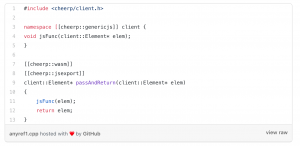
anyref as arguments and return values.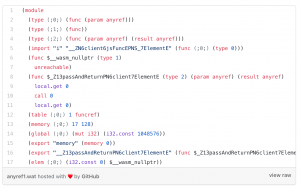
This can be handy, but just passing around pointers without being able to call methods is not too useful. There is currently no support for calling methods on anyref values, but we can generate JavaScript wrappers that take the anyref as a first argument and forward the method call:
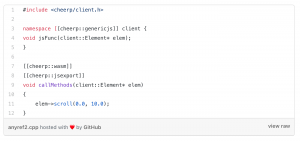

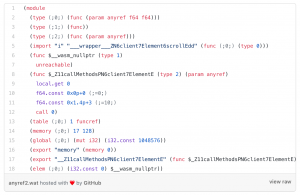
This way we can also allow calling methods on client objects from WebAssembly functions. But what about allocating the objects in the first place? We can generate a wrapper JavaScript function as well, which will return the newly created object:
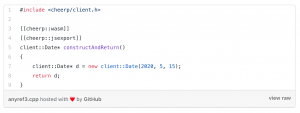

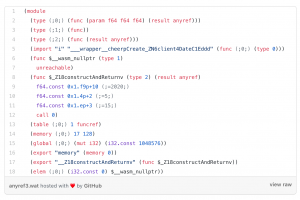
Now we can pretty much do anything with objects in the client namespace directly from WebAssembly!
But what if we want to use global objects, like console or document?
For now, we support limited access to global client objects: we only allow extern declaration of object types (not pointers), and we implement access to them by generating wrapper functions that return the desired global as anyref. This is read-only access, but it is enough to make console, document, etc work:
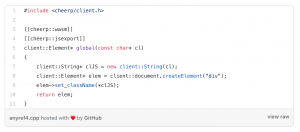

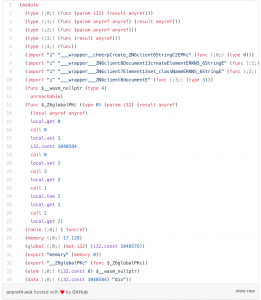
The main limitation that remains is that we have no way of storing anyref values anywhere (from pure WebAssembly code at least, we can always resort to using a cheerp::genericjs function), so we can only handle them for the duration of the function call.
This is annoying, but with future expanded support for globals (using real WebAssembly globals instead of wrapper functions) and exposed access to WebAssembly tables we plan to improve the situation.
Demo
To showcase what is possible to do in the current state, I wrote this (very incomplete) pong-like game using the JavaScript 3d library three.js, implemented with only functions compiled to WebAssembly (excluding the automatic wrappers of course):
Cheerp Anyref example
Live demo
yuri91.github.io
(IMPORTANT NOTE: you need a browser with anyref support in order to try the game. For Chrome, run it with --js-flags="--experimental-wasm-anyref" )
You can find the repo with the source code here.
Conclusions
The anyref feature looks very promising for Cheerp, and we plan to eventually expand its use to all genericjs types, to allow truly seamless interoperability between code compiled to JavaScript and to WebAssembly, as well as external JavaScript libraries.
P.S: The official name of the feature seems to have recently changed from anyref to externref (see this commit).



